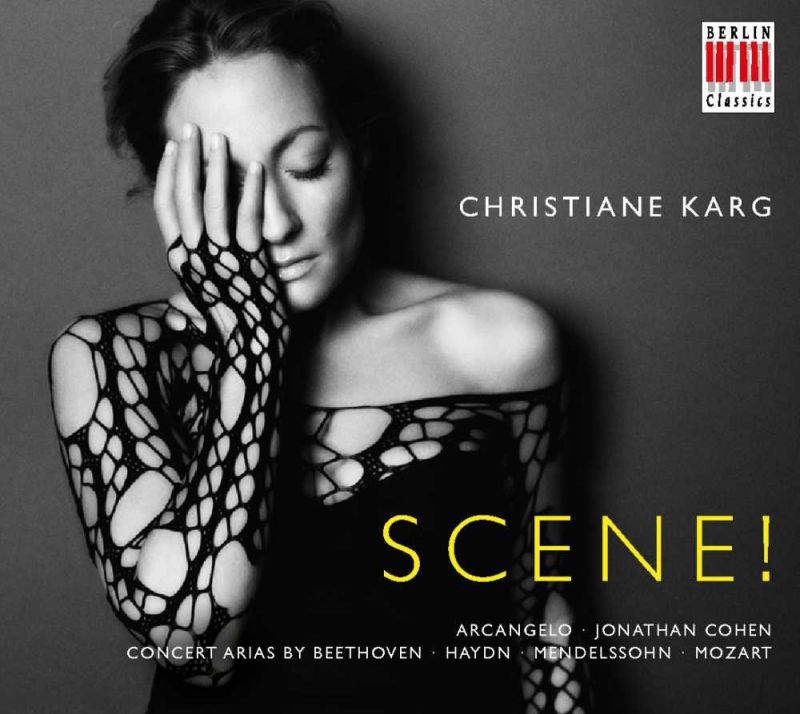Christiane Karg: Scene!
View record and artist detailsRecord and Artist Details
Composer or Director: Joseph Haydn, Felix Mendelssohn, Wolfgang Amadeus Mozart, Ludwig van Beethoven
Genre:
Opera
Label: Berlin Classics
Magazine Review Date: 07/2015
Media Format: CD or Download
Media Runtime: 64
Mastering:
DDD
Catalogue Number: 0300646BC

Tracks:
| Composition | Artist Credit |
|---|---|
| Ah! perfido |
Ludwig van Beethoven, Composer
Arcangelo Christiane Karg, Soprano Jonathan Cohen, Conductor Ludwig van Beethoven, Composer |
| Ch'io mi scordi di te...Non temer, amato bene |
Wolfgang Amadeus Mozart, Composer
Christiane Karg, Soprano Malcolm Martineau, Piano Wolfgang Amadeus Mozart, Composer |
| Miseri noi! misera patria! Funesto orror |
Joseph Haydn, Composer
Arcangelo Christiane Karg, Soprano Jonathan Cohen, Conductor Joseph Haydn, Composer |
| Berenice che fai |
Joseph Haydn, Composer
Arcangelo Christiane Karg, Soprano Jonathan Cohen, Conductor Joseph Haydn, Composer |
| Misera! dove son...Ah! non son io |
Wolfgang Amadeus Mozart, Composer
Arcangelo Christiane Karg, Soprano Jonathan Cohen, Conductor Wolfgang Amadeus Mozart, Composer |
| Infelice |
Felix Mendelssohn, Composer
Alina Pogostkina, Violin Arcangelo Christiane Karg, Soprano Felix Mendelssohn, Composer Jonathan Cohen, Conductor |
Author: Richard Wigmore
That indefatigable one-man libretto factory Pietro Metastasio is the linking thread in these scenas of damsels in extremis, complemented in Ch’io mi scordi di te by the pseudo-Metastasio of Idomeneo librettist Gianbattista Varesco. With Beethoven’s Ah, perfido!, Christiane Karg’s expressive lyric soprano edges towards Leonore territory in a bid, as she puts it in the booklet interview, ‘to push boundaries, and to test my voice in other registers’. If you’ve heard Nilsson and Callas in this music, Karg might initially seem underpowered. But we are, after all, still in the 18th century. In close collusion with Jonathan Cohen’s crack period band, Karg lives each nuance of the abandoned heroine’s fluctuating emotions, from vengeful outrage to morbid pathos. She burns into the Italian consonants in the recitative, spins a tender legato in the aria’s slow opening section, then flares thrillingly into accusatory fury in the Allegro. Throughout, Karg holds vocal finesse and expressive intensity in near-ideal equipoise.
Haydn noted in his quaint English that the Italian diva Brigida Banti ‘song very scanty’ in the 1795 premiere of his Scena di Berenice. He would surely have had no qualms about Karg’s performance, whether in the gravely sculpted line of the Adagio aria or the passionate abandon of the F minor close, where she unfurls a surprisingly powerful chest register. In Miseri noi, Haydn’s music is too serenely dignified for such a grim text, but Karg brings it alive in a way I have never heard before, making the coloratura sound desperate, in the right sense, rather than merely brilliant.
In Mozart’s ravishing Ch’io mi scordi di te, Karg complements the delicate tones of Malcolm Martineau’s fortepiano in an unusually intimate performance, softening her naturally bright timbre and ornamenting with taste and discretion. The relative oddball here is the rare Mendelssohn scena in its original London version of 1834: an entertaining piece of near-pastiche, with a slow aria with violin obbligato – silkily expounded by Alina Pogostkina – that sounds like Mozart grown faintly decadent, and a seething Allegro that seems to cross Beethoven and Rossini. Karg spits contempt for her faithless lover in the opening recitative, then matches the violin in yearning eloquence before surging with controlled delirium through Mendelssohn’s long lines in the Allegro. Looking for trouble, I wanted a slightly closer balancing of the fortepiano in Ch’io mi scordi di te. But this is nit-picking. Singing with style, grace and fiery temperament, Karg brings each of these distraught heroines excitingly, individually alive, while the superb players of Arcangelo – not least the dulcet clarinets – are true dramatic partners rather than mere accompanists.
Discover the world's largest classical music catalogue with Presto Music.

Gramophone Digital Club
- Digital Edition
- Digital Archive
- Reviews Database
- Full website access
From £8.75 / month
Subscribe
Gramophone Full Club
- Print Edition
- Digital Edition
- Digital Archive
- Reviews Database
- Full website access
From £11.00 / month
Subscribe
If you are a library, university or other organisation that would be interested in an institutional subscription to Gramophone please click here for further information.




